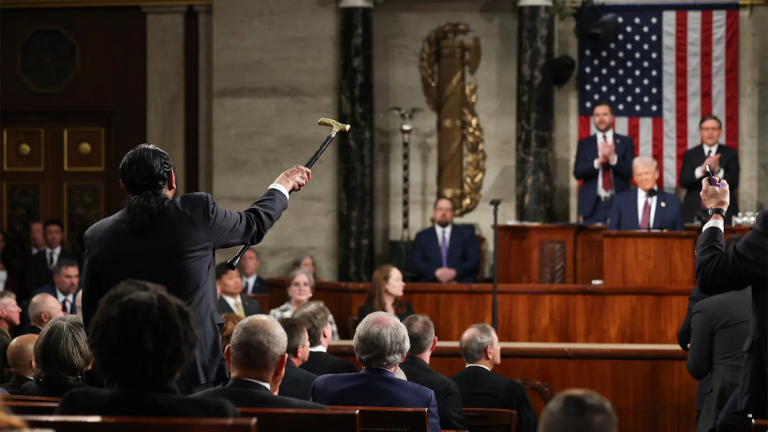
The contrast between Green’s dignity and Harshbarger’s insensitivity is profound
New York, N.Y. – In an era that often feels like a sepia-toned postcard from the past, a jarring incident in Congress has pulled America back to the uncomfortable echoes of its history.

Tennessee Republican Rep. Diana Harshbarger, in a recent interview on a Christian podcast, referred to 77-year-old Texas Democratic Congressman Al Green as “boy”—a term laden with racial weight, historically used to demean Black men.
The comment, paired with Harshbarger’s mockery of Green’s cane and derogatory remarks about the LGBTQ+ community, has sparked a firestorm of criticism, reminding the nation of both its progress and its lingering divides.
The incident harks back to a time when civility in public discourse was a cherished ideal, yet LGBTQ+ community. Harshbarger’s words, delivered with a casual tone, have stirred a nostalgic longing for a more respectful political arena, while also igniting a modern-day reckoning.
Green, a seasoned lawmaker known for his fiery advocacy, was targeted after his bold protest during President Donald Trump’s February 2025 address to Congress, where he brandished his cane to oppose proposed Medicaid cuts. The House censured Green for the disruption, but Harshbarger’s response has shifted the spotlight.
A Painful Echo of History
The word “boy,” when directed at a Black man, carries a heavy legacy. As Martin Luther King Jr. wrote in his “Letter from Birmingham Jail,” it was one of the daily “humiliations” inflicted on Black Americans. The Supreme Court has recognized its potential as a racial slur, depending on context.
Harshbarger’s use of the term, coupled with her suggestion that Green’s cane was a “prop” or even concealed a weapon, has been widely condemned as racially insensitive. Civil rights advocates argue it evokes a time when Black men were systematically infantilized and dehumanized.
Yet, there’s a bittersweet nostalgia in this moment—a reminder of how far the U.S. has come since the days of Jim Crow, when such language was routine. Green, born in 1947, lived through that era, and his resilience as a congressman embodies the progress of the civil rights movement. His supporters see him as a symbol of defiance, wielding his cane not as a prop but as a badge of endurance.
A Broader Pattern of Insensitivity
Harshbarger’s remarks didn’t stop at Green. In the same podcast, she referred to LGBTQ+ individuals as “fairies,” a slur that further fueled outrage. The dual controversies have painted a picture of a lawmaker out of step with modern sensibilities, yet her defenders argue she was merely reflecting the blunt rhetoric of a bygone era.
This defense, however, has done little to quell the backlash. Social media platforms, particularly X, have buzzed with hashtags like #CongressControversy, as users debate the line between free speech and hate speech.
The incident recalls a time when political discourse, though often heated, aimed for a veneer of decorum. Today’s polarized climate, amplified by viral soundbites, makes such moments feel both shocking and oddly familiar. Harshbarger’s office has not responded to requests for comment, leaving the public to grapple with her words in the context of America’s evolving values.
Green’s Defiant Response
Congressman Green, undeterred, has continued his advocacy with characteristic vigor. His protest against Medicaid cuts was a nod to the activist spirit of the 1960s, when ordinary citizens took bold stands against injustice. In a statement, Green emphasized unity, saying, “We must rise above division to build a stronger nation.” His words evoke the hopeful rhetoric of that era, when leaders dreamed of a more inclusive America.
Green’s supporters have rallied around him, sharing stories of his decades-long fight for equality. On X, posts praising his courage have trended alongside calls for Harshbarger’s censure. The contrast between Green’s dignity and Harshbarger’s insensitivity has become a rallying point for those nostalgic for a politics of principle over provocation.
A Call for ReflectionThis controversy, while painful, offers a chance to reflect on America’s journey. The outrage over Harshbarger’s words signals a society less tolerant of casual bigotry than in decades past—a marker of progress. Yet, the incident also underscores how quickly old wounds can reopen. As the nation looks back on its history, there’s a collective yearning for the unity championed by figures like Green.
In this nostalgic moment, the U.S. stands at a crossroads. Will it embrace the lessons of its past or repeat its mistakes? Harshbarger’s slur may fade from headlines, but its ripples will linger, urging Americans to recommit to a future where respect triumphs over division. For now, Green’s cane remains a powerful symbol—not of weakness, but of a nation’s enduring struggle to stand tall.